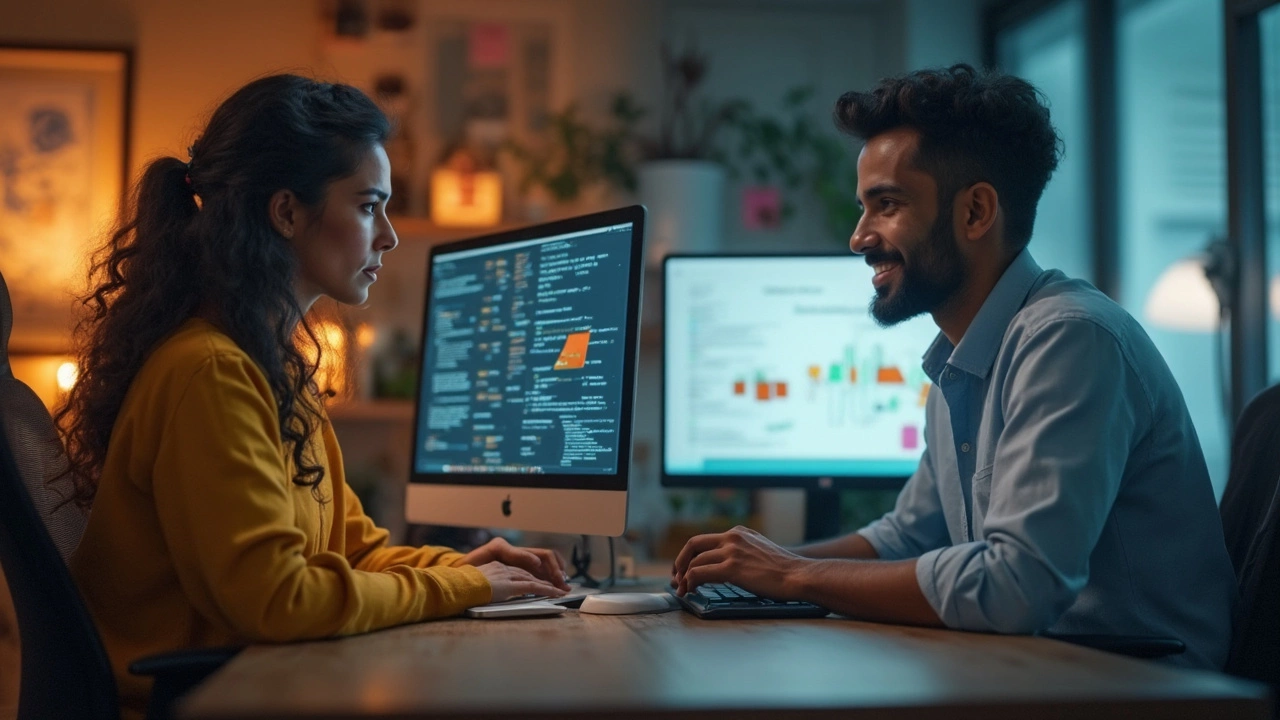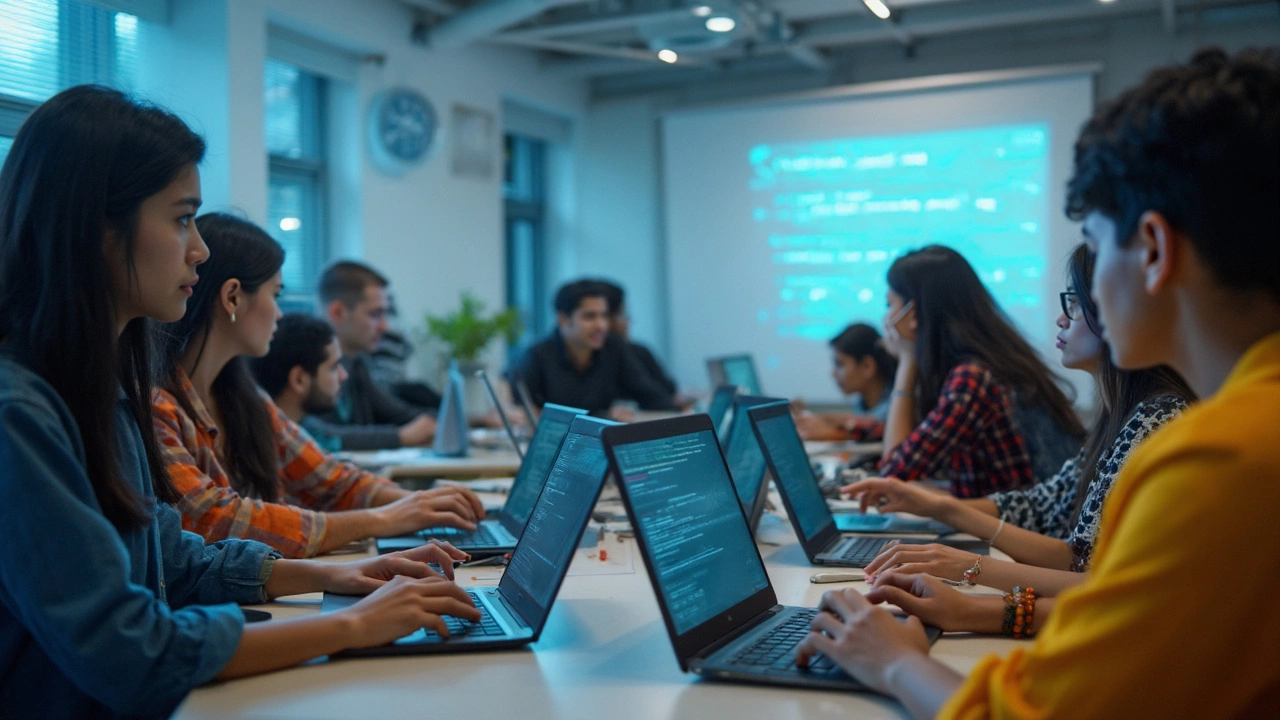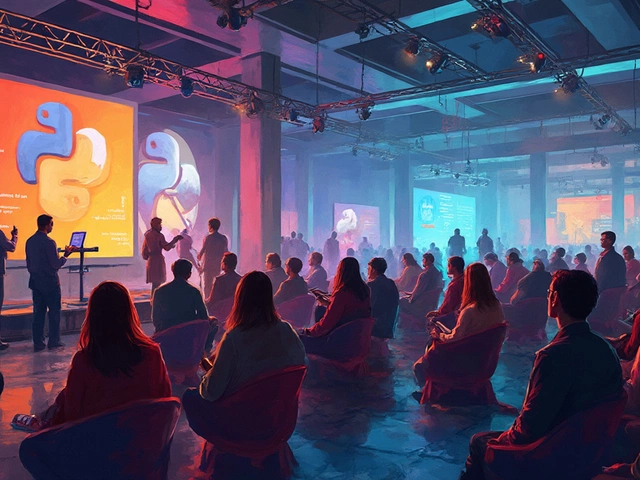People often use 'programming' and 'coding' like they're the same thing, but they're not. If you've ever stared at a list of courses online and wondered if you need to learn coding, programming, or both, you're definitely not alone.
Coding is all about writing lines of code—think of it like speaking the language a computer understands. Programming, though, is more like planning the entire trip and then telling the computer every stop along the way. A lot of folks get trapped trying to learn every coding language, but forget learning to program is about solving problems, not just typing commands.
Code can be as simple as "add these two numbers," but programming means thinking: What do I do with the answer? When does this run? What happens if something goes wrong? Once you spot the gap, you'll see why entry-level coding is only a small chunk of what real software builders do every day.
- What Does Coding Mean, Really?
- How Programming Steers the Big Picture
- What Makes a Programmer vs a Coder?
- Everyday Examples: Coding vs Programming
- Which Skills Matter Most for Beginners
- How to Pick the Right Class for You
What Does Coding Mean, Really?
Coding is about giving instructions to a computer in a language it understands. Those instructions are written in special languages like Python, JavaScript, or Java. When you type in a line like print("Hello, world!"), you’re telling the computer exactly what to do, step by step.
Think of coding as translating your ideas into a set of rules that a machine can follow. It’s not about big-picture planning or fancy concepts. It's about getting your hands dirty in the details—making sure every ; and {} lands in the right place. Even a missing character can break everything, which is probably why about 70% of beginner coding errors are just typos or misplaced symbols (according to a 2024 survey from Codecademy).
The goal with coding is to build scripts or small programs that do one clear job—maybe something like adding numbers, sorting a list, or sending an email. Everything else, from designing complex apps to planning game logic, comes later.
- Coding usually uses clear and simple instructions.
- You don’t need to invent a solution—you just follow rules for the problem at hand.
- Coders mostly deal with things like syntax, loops, and conditions.
Let’s check out a few key details that help separate coding from other tech skills:
| Aspect | What Coders Do |
|---|---|
| Focus | Write lines of code |
| Main Concern | Get code working with no errors |
| Typical Tasks | Fix bugs, add features, edit existing code |
| Learning Curve | Lower (at first), thanks to lots of online tutorials |
If you're jumping into coding classes, expect to learn the basics first: how to talk to the computer, make it do small jobs, and fix your mistakes as you go. Start simple, and you’ll build up real skills faster than you think.
How Programming Steers the Big Picture
Programming isn’t just typing out code until it works. It’s about seeing the whole system from above and designing how all the parts fit together. When you program, you plan out what the entire software will do, how users will interact with it, and what should happen when things don’t go as planned. Picture it like being the person building a house—you’re not just hammering nails, you’re designing the foundation, the rooms, even the plumbing.
This big-picture thinking means making decisions like which coding language fits the job, how to organize code for easy updates, or how to make the software secure. Good programmers map out features before they ever start writing code. For example, teams at places like Google and Airbnb often use something called "flowcharts" or "UML diagrams" to sketch out how everything should work before diving into the nitty-gritty of coding.
Debugging and testing are a huge part of programming, too. When you’re programming, you have to think ahead about what could break and how to catch those problems early. This is why programmers always write tests and fix bugs, making sure everything works smoothly for the end user.
If you’re taking programming seriously, you’ll care about stuff like version control (think GitHub), project documentation, and making your code readable by others. Big projects—even small apps—need more than just the basic code. It’s about structure, teamwork, and planning so the code actually solves the user’s problem, now and next year, too.
What Makes a Programmer vs a Coder?
If you’re just starting out, the difference between a programmer and a coder might sound nitpicky. But in tech interviews and job ads, the gap is obvious. Coders get things done by translating instructions into computer language. Programers take the bigger challenge—they build, plan, troubleshoot, and even handle team communication.
Here’s a practical breakdown:
- Coders focus on writing code that works. Their job is to turn logic or instructions into lines the computer can run. They're usually given clear guidelines or specs.
- Programmers dig deeper. They figure out what needs to be done, why, and how. They solve bigger problems, design solutions, and write code too—but their work goes beyond that. Programmers also debug, test, and improve code, and often work on teams where collaboration and planning matter.
You can think of it this way: all programmers can code, but not all coders are programmers. If you can fix a recipe that’s going wrong or invent your own, you’re thinking more like a programmer—not just following instructions step-by-step like a coder.
Companies look at these skills differently, too:
| Role | Main Focus | Skills Expected | Average Salary (US, 2024) |
|---|---|---|---|
| Coder | Translating specs to code | Knows one or more coding languages, basic debugging | $60,000 |
| Programmer | Building and planning software projects | Problem-solving, system design, multiple languages, teamwork | $88,000 |
One surprising stat: Research from Stack Overflow’s 2024 survey found almost 55% of professional programming jobs expect you to design and plan solutions, not just write code. If you want to level up, start learning how to break big problems into smaller parts and sketch out how systems work before you start typing.

Everyday Examples: Coding vs Programming
If you're still wondering what the difference looks like in real life, let’s break it down with some straight-up examples. Imagine you're building a calculator app to add numbers.
Coding would be you sitting down, writing a chunk of code that does the addition, like:
- Input number 1
- Input number 2
- Print sum of numbers
But programming takes it way further. You’d also decide things like:
- What if someone forgets to enter a number?
- Should the app support subtraction or multiplication later on?
- How will the results show up—pop-up, or inside a history log?
- What happens if someone enters text instead of a number?
The big difference? Coding gets one task done. Programming makes the whole thing work from start to finish. When you use a ride-hailing app, the code tells your location and your driver’s location. The programming, though, sorts out matching, route suggestions, and billing—basically, all the stuff that keeps the entire app running smoothly.
Here’s a well-put quote from Bill Gates, who knows a thing or two about this stuff:
“Learning to write programs stretches your mind, and helps you think better, creates a way of thinking about things that I think is helpful in all domains.”
Take websites, for instance. Coding is like writing the HTML for a button. Programming means deciding when that button should show up, how it connects to a database, or what it does after you click it.
Check this out—look at how different tasks can stack up in coding versus programming for a simple mobile app:
| Task | Coding | Programming |
|---|---|---|
| Login Screen | Write the form in code | Plan security, validate inputs, connect to server |
| Adding a Feature | Add new function to codebase | Decide how user interacts, test impact, debug errors |
| Error Handling | Display error message with code | Come up with backup plans, fix crashes, collect bug reports |
If you just want to edit a webpage or automate a small task, basic coding might be enough. If you're dreaming up apps or want to tackle bigger challenges, you'll jump into programming. The key is to know what kind of problem you’re trying to solve so you can pick the right approach.
Which Skills Matter Most for Beginners
If you're just getting started with coding or programming, don't get lost chasing too many skills at once. Most beginners waste time trying to read thick manuals or jump between dozens of languages. Instead, focus on a few clear skills that actually move you forward.
- Understanding the basics of logic: Computers only do what you tell them. If you know how to break a problem down into steps—like making a sandwich or following a recipe—you can code.
- Getting comfy with one language: Don't spread yourself thin. Start with something friendly like Python or JavaScript. Both are used everywhere, and learning one well is better than skimming five.
- Debugging: You will make mistakes. Learning how to find and fix errors with print statements (or a debugger) will save hours.
- Thinking in patterns: Look for repeated steps or solutions, like loops or functions. Experts reuse logic all the time, and you can too.
- Using version control: Even beginners should use Git. It helps you track changes, back up your work, and collaborate, even if you're working solo.
There’s a stat from Stack Overflow that says 70% of developers use version control tools daily in their work. That’s how important these skills are. And here's a quick table showing the most common starter skills new coders use—based on surveys in 2024:
| Skill | % of Beginners Practicing |
|---|---|
| Problem Solving | 82% |
| Writing Simple Programs | 78% |
| Debugging | 66% |
| Using Version Control | 52% |
| Understanding Algorithms | 44% |
Keep your focus sharp. Stick to practical skills, and spend your time where it pays off quickest—learning how to actually build and fix things, not just watch tutorials or memorize theory. When it comes to programming, a small toolkit used well always beats a big one you barely touch.
How to Pick the Right Class for You
Picking the right coding class is kind of like shopping for sneakers—they may all look similar but fit totally differently depending on what you need. Whether you want to build apps, crunch numbers, or just automate boring tasks, there’s a class that matches your goals and your learning style.
Start by figuring out your end game. Do you just want to learn a coding language, or do you want to become a full-on programmer who can take a problem and build the whole solution? Coding classes will usually focus on the basics, like syntax and how to write simple scripts in Python or JavaScript. Programming classes go deeper, teaching you planning, debugging, and how to put together a full project.
Here are a few things to look for when picking a class:
- Project-based learning: Does the class make you build something real, not just toy examples?
- Instructor support: Can you ask questions and get real answers, or is it all up to you?
- Lesson format: Video, interactive coding, text, or a mix? Pick the style that keeps you involved.
- Community: Are there people you can talk to, join in on projects, or ask for help?
- Prerequisites: Any past experience needed? Make sure you’re not jumping in too deep.
If you’re a numbers person, check this table showing what kind of results students often see, based on real data from Course Report’s 2024 coding bootcamp survey:
| Class Type | Job Offer Rate | Average Time to First Job | Beginner Friendly |
|---|---|---|---|
| Beginner Coding (Python Basics) | 67% | 4.5 months | Yes |
| Full Programming (Web Dev Bootcamp) | 84% | 3.2 months | No (previous basics needed) |
| Self-paced Online Tutorials | 54% | 6.1 months | Yes |
Want a tip? Always try to read a couple of student reviews before paying for a class. Sometimes even a highly rated class can be too fast, too slow, or way too hard for beginners. Most major platforms let you see sample lessons—don’t skip those! And if you’re stuck between choices, go for the one that gives you real projects to work on. That’s where skills really stick.



